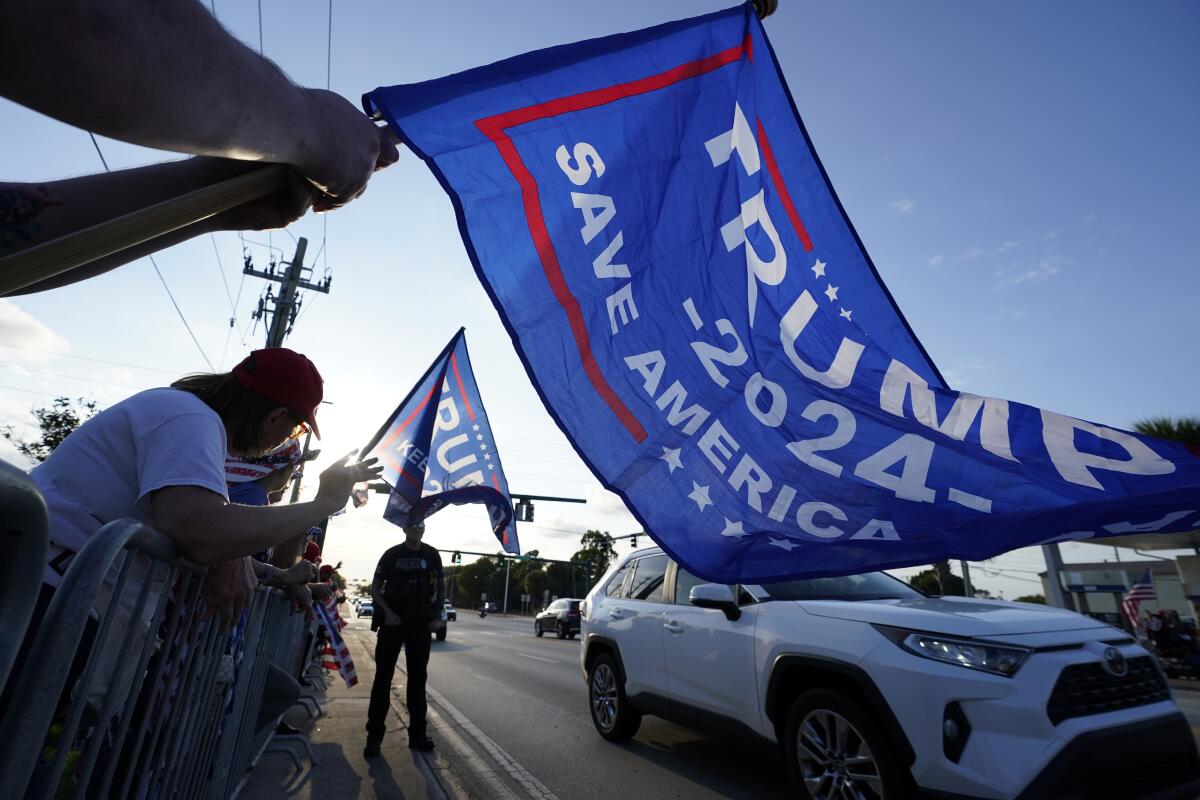Column: Trump’s indictment reflects the failures of our populist passions

- Share via
America blew it.
I generally support special prosecutor Jack Smith’s indictments of Donald Trump. The classified documents case is open-and-shut as far as I can tell. As for the charges dealing with the former president’s attempt to steal the election, they are a heavier lift as a strictly legal matter. Some charges may not clear the evidentiary and legal hurdles in their path, but are still worth bringing.
Trump supporters disagree. Their arguments span from anti-American idiocy (Trump is America’s Alexei Nalvany) to good-faith, nuanced complaints about the insufficiency of the statutes Smith is relying upon.
But even if Smith has the law and evidence entirely on his side, the fact that we’ve come to prosecuting a former president is proof of the breakdown of republicanism.
That Trump was nominated, never mind elected, president is a sign of collective, systemic failure. Blame is not evenly distributed among the parties, voters, the media and other institutions, but nearly all deserve their share.
There isn’t room here to tell the full story from the beginning. I’d start with Bill Clinton and Newt Gingrich, though you could make the case it begins with Richard Nixon.
Regardless, without the populist polarization of our politics a man as unfit for high office as Trump would never get near the presidency. Had we not spent decades weakening political parties with well-intentioned, but ultimately foolish, “reforms” like outsourcing nominations to primaries and campaign finance changes that, together, gutted the ability of parties to bar unfit candidates from the nominating process, Trump would still be a reality show host.
We spent decades, on the right and left, weakening institutional, journalistic and cultural walls between politics and entertainment and then were surprised when the tide of populist passion swamped good government.
The impeachment process, intended as a republican check on the abuse of power, is illustrative. After three invocations in 25 years, the impeachment clause has become a constitutional zombie clause, functionally dead but still capable of damage.
Two of the most powerful corruptors of American politics — or republican virtue — are populism and legalism. Populism assumes that large, angry constituencies are right regardless of what the law or Constitution says. Legalism, in this context, works on the assumption that officials, including politicians, can avoid doing what’s right if they can hide their cowardice behind some legal technicality.
Obviously, naked violations of criminal law are impeachable. But so are violations of the public trust. In the early drafts of the Constitution, impeachable offenses were called “maladministration,” describing misdeeds that are not necessarily criminal but that are nonetheless corruptly self-serving. James Madison, who forced the replacement of “maladministration” with “high crimes and misdemeanors” nonetheless believed that misusing presidential powers for corrupt schemes (like pardoning allies to further such schemes) was subject to impeachment.
But in Trump’s two impeachments, populism and legalism formed a pincer movement that foreclosed conviction. The ubiquitous GOP claim that convicting Trump would “overturn” the will of the people was populist blather. Trump lost the popular vote, and no one voted for Trump to do any of the things that got him impeached. Removal from office in the first impeachment wouldn’t have made Hillary Clinton president, but it would have placed Mike Pence in the White House, and he got as many votes as Trump himself.
As for the legalism, my God. Over and over, defenders and accusers alike talked about impeachment as if it were criminal proceeding (as in Bill Clinton’s impeachment trial). Terms like “beyond a reasonable doubt,” “due process,” “no one is above the law” peppered the airwaves. TV lawyers, on all sides, would occasionally admit “impeachment is a political process” and then proceed to pretend that only lawyers, not politicians, were equipped with the expertise to decide what is or isn’t impeachable.
And politicians were all too eager to buck responsibility by deferring to the lawyers.
In a republic, legitimacy is derived from popular consent. But the only oath officials take is to the Constitution, not to the people who elected them (or to their bosses). Their mandate is neither their personal ambition nor popular passion, but the public good and the constitutional order.
Political parties, likewise, are supposed to be republican in that they’re obliged to protect a set of ideals and interests that are more important than any single politician. The press is supposed to do more than cater to the passions of their audience.
Smith’s indictments are a necessity because so many others refused to do what’s necessary.
More to Read
A cure for the common opinion
Get thought-provoking perspectives with our weekly newsletter.
You may occasionally receive promotional content from the Los Angeles Times.











